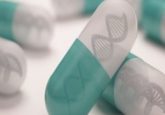Could evaluating serum biomarkers help tailor neoadjuvant treatment in esophageal cancer?

The results of a 9-year study of patients with esophageal squamous cell carcinoma (ESCC) have indicated that a blood test could be valuable for predicting neoadjuvant treatment needs. The findings were presented recently at the 56th Annual Meeting of the American Society for Radiation Oncology (held 14–17 September, San Francisco, CA, USA).
The study encompassed the evaluation of serum samples isolated from 103 patients with ESCC between 2004 and 2013. All these individuals received concurrent chemotherapy and radiotherapy prior to esophagectomy, therapy that comprised taxane- or 5-fluorouracil-based chemotherapy and 40 Gy dose of radiation therapy. Serum samples were collected both before the initiation of this neoadjuvant therapy and within one month of completion of initial therapy.
Serum samples were screened for the presence of 15 serum biomarkers in order to evaluate their potential association with pathological tumor regression upon surgery and survival. The markers that were noted to be significantly associated with pathological disease response and survival rates were further confirmed by ELISA testing. Statistical investigations were then carried out to identify any associations between these biomarkers and factors associated with pathological response, including disease free survival and overall survival.
The results revealed that ESCC patients with high levels of VEGF-A were significantly less likely to achieve complete tumor regression. Patients with pre-treatment VEGF-A of less than 250 pg / ml were more likely to have pathologically complete response after neoadjuvant treatment (57.1%) compared with patients with VEGF-A of more than 250 pg / ml (26.5%, p = 0.002).
Additionally, those expressing high levels of both VEGF-A and TGF-β1 prior to therapy were associated with significantly reduced disease-free and median overall survival (OS 19.2 months vs 46.2 months, p = 0.07) when compared with those expressing lower levels.
“Through the utilization of a specific blood test of serum biomarkers, we could potentially predict if a patient will have a favorable pathological response and outcome before radiotherapy,” commented senior study author Jason Cheng, of National Taiwan University Hospital and National Taiwan University College of Medicine (Taipei, Taiwan).
He continued: “Treatment could be tailored for patients in order to achieve better outcomes and/or fewer side effects. Our study showed that the serum levels of VEGF-A and TGF-β1 were significant only before treatment. This would allow us to individualize the neoadjuvant treatment regimens based on the pre-treatment serum levels of VEGF-A and TGF-β1.”
Source: American Society for Radiation Oncology press release



